Berlusconi will win the elections and we should blame it on the memes
Italians want to go back to the 90s and Silvio is giving them a good old flashback.
Together with “pizza, pasta and mandolin”, Silvio Berlusconi, aka il Cavaliere, remains one of the most iconic figures associated with Italian culture abroad. Rumor has it that he is bound to make an explosive comeback for the upcoming 2018 Italian elections and memes and internet culture may have played a big role in dusting off his public appeal. Who is Silvio Berlusconi and how did he manage to become a living meme?
Berlusconi, His fame preceeds him
The 81-year-old entrepreneur has been active in many political roles: from creating the leading center-right party of the nation: Forza Italia, taking seat in both parliamentary chambers, the ministry of finance, economy, health and that of foreign affairs, to being elected prime minister four times. Being a former member of the P2 masonic lodge, Berlusconi has been in Italian politics from the early 90s and has never really left; even from behind the scenes, he was able to maneuver his party for decades and many refer to this as “Berlusconi’s 20 years”, showing how rooted his persona is in the collective imagery of the country.
With a net worth of $4 billion, he owns magazines, football teams, a whole TV network and dozens of properties (land, houses, boats and so on). Unfortunately, most of his fame abroad (especially among foreign politicians) resides in the multiple controversies that emerged from his private life and (ab)uses of power. Various scandals took place during his career, and by various I mean there is a whole 30-page-long Wikipedia-page dedicated to his ongoing and past trials and crimes. They range from fraud, bribery, associating with the mafia, defamation, to abuse of office and prostitution of minors. Moreover, many of the crimes related to fiscal matters have been promtly discharged, because Berlusconi managed to change some laws while he was still prime minister, making what was once illegal now completely fine.
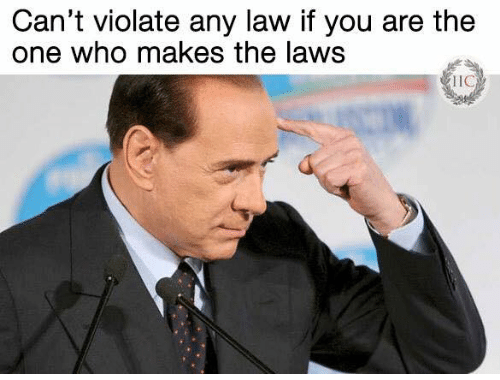
A meme on Berlusconi's "ad personam" law-making process
Yet, the scandals he is most known for are the ones concerning the closed parties at his villa in Arcore, where he allegedly invited multiple escorts and one of them, Ruby, turned out to be underage at the time, making him chargeable with child prostitution. In the end, the only crime he was convicted of was the one on fiscal fraud, for which he was forced to resign from office in 2013 (because of a new law “legge Severino” which forbids anyone who has been charged with specific crimes to hold any public office position). He was supposed to spend four years in prison, but he managed to get the sentence reduced to one year, which he spent in a retirement clinic because of his old age. He has now appealed to the Court of Human Rights in Strasbourg, in order to be able to run again for the 2018 general elections and the Court will decide whether or not to accept his appeal in the up-coming months.
What do memes have to do with this?
Blommaert and Varis (2015) define memes as "multimodal signs in which images and texts are combined… which would enable intense resemiotization".
Texts and images can vary, depending on the genre of the meme itself: sometimes the same image is used with different captions (as in most of Berlusconi’s memes), other times the same caption would be used for different images (as in the lolspeak memes genre). Either way, memes have to be relatable to particular groups of people and create “structural levels of conviviality” (Blommaert and Varis, 2015). Berlusconi’s memes don't just target the people who are interested in Italian politics but, as Appadurai would phrase it, a much larger mediascape, which is composed by all those Italians (over 30 million) who have access to online social networks such as Facebook, Twitter and Reddit. These memes can be seen as a very specific form of self-marketing, even if Berlusconi is not the direct creator.
When memes get entangled with politics, they create a very specific type of satire, which relies on crystalizing and emphasizing the most popular (or unpopular) traits of a politician, contributing to influencing the public perception of a specific subject. The Canadian Prime Minister Justin Trudeau, for example, is mostly represented in memes that highlight his good looks, rather than his policies, while the President of the EU Commission Jean-Claude Juncker is mocked for drinking too much. Even Jeremy Corbyn has his own meme page on Facebook called “Jeremy Corbyn photoshopped into appropriate situations” and it is absolutely hilarious.
(In)famous for his jokes in poor taste
Berlusconi built his persona on the basic right winged and liberal (as in pro-market not as in progressive) ideals: making him the typical idol of the conservatives. Catholicism, racism and homophobia did the rest to homogenize his electorate. He became the self-made man, too rich to be bribed, who advocated for the dismantling of the old political “intellectual communist” class for the benefit of the masses. With the advent of the World Wide Web, all of his shenanigans were soon available for everyone to consume online and they immediately went viral. The videos in which he uses antisemitic discourse in the European parliament when addressing the PSE’s President Martin Schultz have gotten millions of views on YouTube; in them, he says the following words:
I know that in Italy there is a man producing a film on Nazi concentration camps - I shall put you forward for the role of Kapo - you would be perfect! (Berlusconi)
Public opinion is still divided between the ones who feel unbearable shame for our country and the ones who laugh and think he was the OG (original gangster) of Italian politics.
Berlusconi used all the media coverage he could get to his advantage: spinning the public opinion as he pleased. How did he do that? He manipulated the perception of the masses with his great oratory skills into seeing him as this benevolent, funny and outgoing man, who never fears to express his opinion and cares for the well-being of his country.
Berlusconi is now a living meme
A living meme, according to the Urban Dictionary, is a living person, who has become iconic in pop-culture; Pop-culture icons. Berlusconi has always been in the center of political satire and has given comedians a lot of material to work with; sexist jokes, embarrassing international appearances and endless criminal accusations. We are talking about the man who called Angela Merkel an "unfuckable lard-arse" and who claimed that:
Mussolini never killed anyone. Mussolini used to send people on vacation in internal exile. (Berlusconi)
What has changed over time, is the nature and quantity of memes created about him. There are hundreds of thousands of pictures that mock him and his political agenda. From the iconic mantra “Love always wins over hate” and the “I will give you back …” memes, which allude to the promises he made on the campaign trail to give back part of the income tax to all citizens and now figure him giving back all sorts of hilarious things, to the countless memes of him with sunglasses on, doing cool things or just being tough... and how can we forget the memes of him holding a little lamb last Easter?!
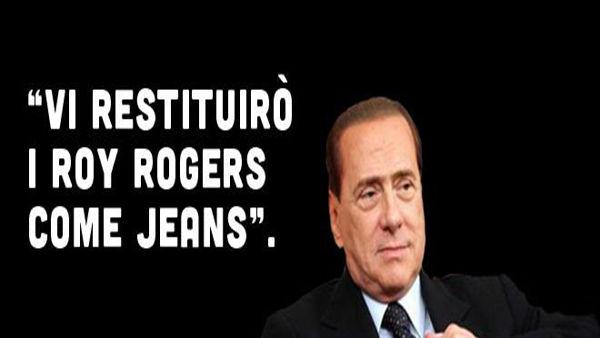
I will give you back Roy Rogers jeans

Berlusconi is the new Messiah

He protects, he attacks, but mostly: "Italy is the country I Love"
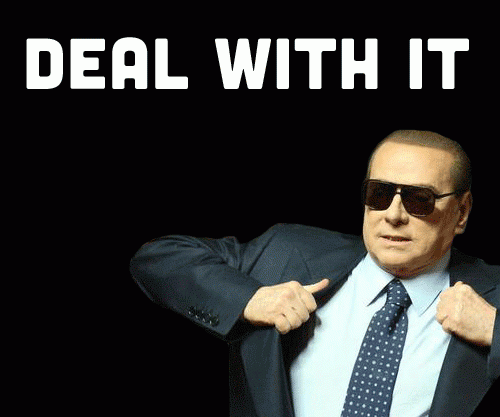
Berlusconi being an OG with his shades on
Many other memes simply depict him telling one of his offensive jokes, but what should concern us the most are the ones that have more nostalgic tones to them. Almost all of this material comes from popular satirical pages and groups on Facebook such as Socialisti Gaudenti (Reveller Socialists) or Irreverent Italian Memes. These pages (the most popular at least) are all on the left wing side of the political spectrum and are looked after by young people who deal with politics on a daily basis - most of them are active in the democratic party’s youth movement, meaning that they are not intended to promote Berlusconi in any way, at least in theory.
Why are Berlusconi’s memes relevant now?
The historical consciousness of a country is based on what it chooses to remember, and the media play a big role in deciding what to keep alive and what to erase from the common perception of things. Almost five years have passed since Berlusconi’s last conviction and all what came before that is slowly fading into the past. The fact that the political situation in Italy is currently disastrous does not help either. With the rise of a new populist party, Movimento 5 Stelle, which has now overtaken the left wing parties in the polls, the continuous flux of migrants onto our shores and the alarming data on unemployment and wealth distribution; the trust in the public institutions has plummeted and the credibility of the left has almost completely faded along with it.
After years of satire with regards to his jokes and political agendas, the narrative we are exposed to nowadays has almost completely normalized Berlusconi’s behavior. What was comedy then has now become rooted in popular political culture: memes allowed him to become a funny old man who had some trouble with the law because he liked younger women and telling edgy jokes, yet he managed to survive all his trials, turning him into this invincible political force that all admire. He has never stopped being a role model of the successful business/political man, who has women, money and power (no matter how he got these). It feels like we are back in 1994 when, after three months of campaigning, Berlusconi won the general elections. He is back on the covers of magazines (with a whole lot of Photoshop this time), same shot, same party-pin on his jacket advocating all those ideals that crowned him PM over 20 years ago.
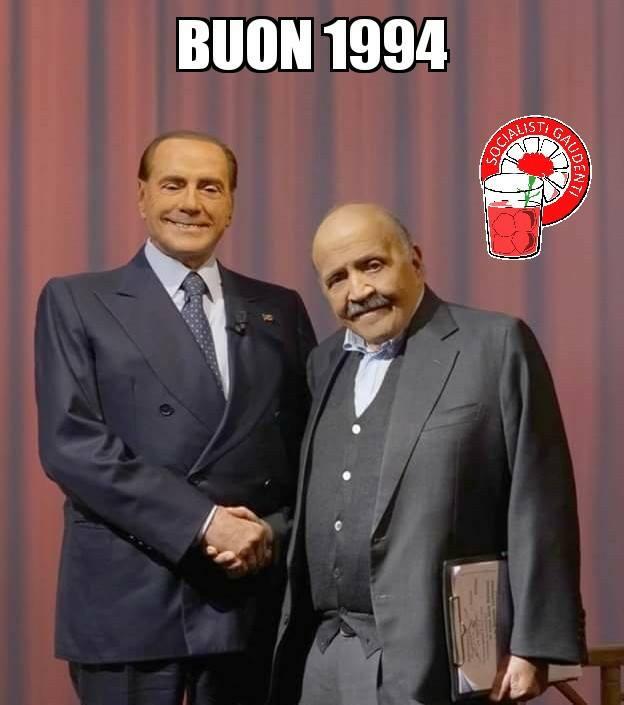
Happy 1994! Berlusconi is back with his friend and tv host Maurizio Costanzo just like in 1994.
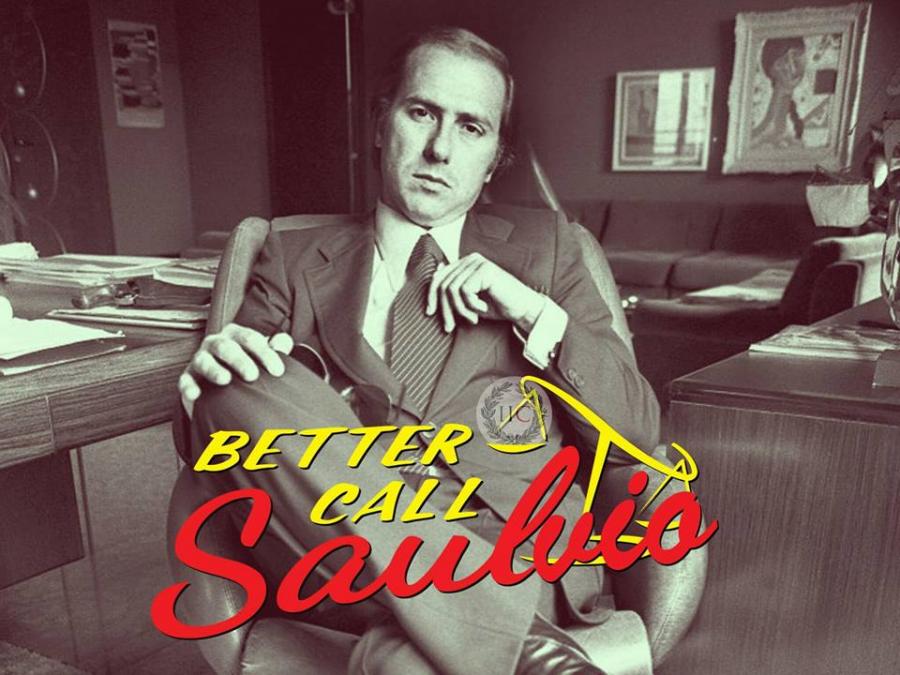
Berlusconi is Saul Goodman from notorious tv-series "Better call Saul"
Memes allowed the public to empathize with this man and evoked a sense of nostalgia and security, creating a longing for the idea that “everything was better back then”. We have now come to a point at which even the people who have always voted left are considering voting for Berlusconi. Innovation has slowly ceded its place to regret and to the idealization of the past, regardless of its downsides, bringing back fear of change and a mistrust of what the future holds.
Berlusconi is telling his electorate through his use of the media that everything can be as it was back in the day; his populism is carefully masked behind his vibrant colors, pins, jokes, promises, positive thinking and faith in eternal youth. He is practically streaming a re-make of what it felt like to live in the 90s.
And it's working!
There are some scary polls that place Berlusconi, or his party, at worrying percentages in the public discourse, some as high as 30%. Whether he will actually be able to run for the upcoming elections is, as for now, in the hands of the Strasbourg Court; but even if his appeal is denied, he will be able to choose another candidate for his party and influence the public opinion by simply openly endorsing them. If Berlusconi gained 5% by cleaning a chair on live television four years ago, what is stopping him from doing the same thing now?
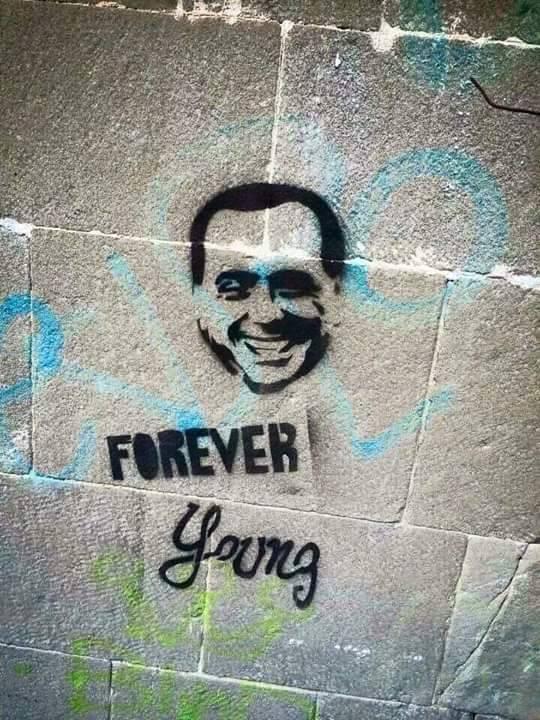
Wall-version of Berlusconi's memes
Should we be worried?
If you long for a time when Italy was globally shamed for its political representatives, who were famous for fraud, bribery, child prostitution, fiscal irresponsibility, sex scandals, ties with the mafia and abuse of power you should be totally fine. If you do not, then we should all roll up our sleeves and start debunking the mythological creature that Berlusconi has become. We should acknowledge the many flaws of his administration and realize that, just because something or someone is made fun of, does not acquit anyone of their charges. Memes have become a powerful instrument, and just like any other medium, they should be contextualized and rationalized in order to be funny yet non-misleading in their meaning. I feel like we have become recidivist towards our history, willing to remember only what we want to remember, even if that neglects major mistakes we have made in the past.
With all the nationalists and populists that are currently gaining consensus around the world, do we really need another one? For the 5th time?
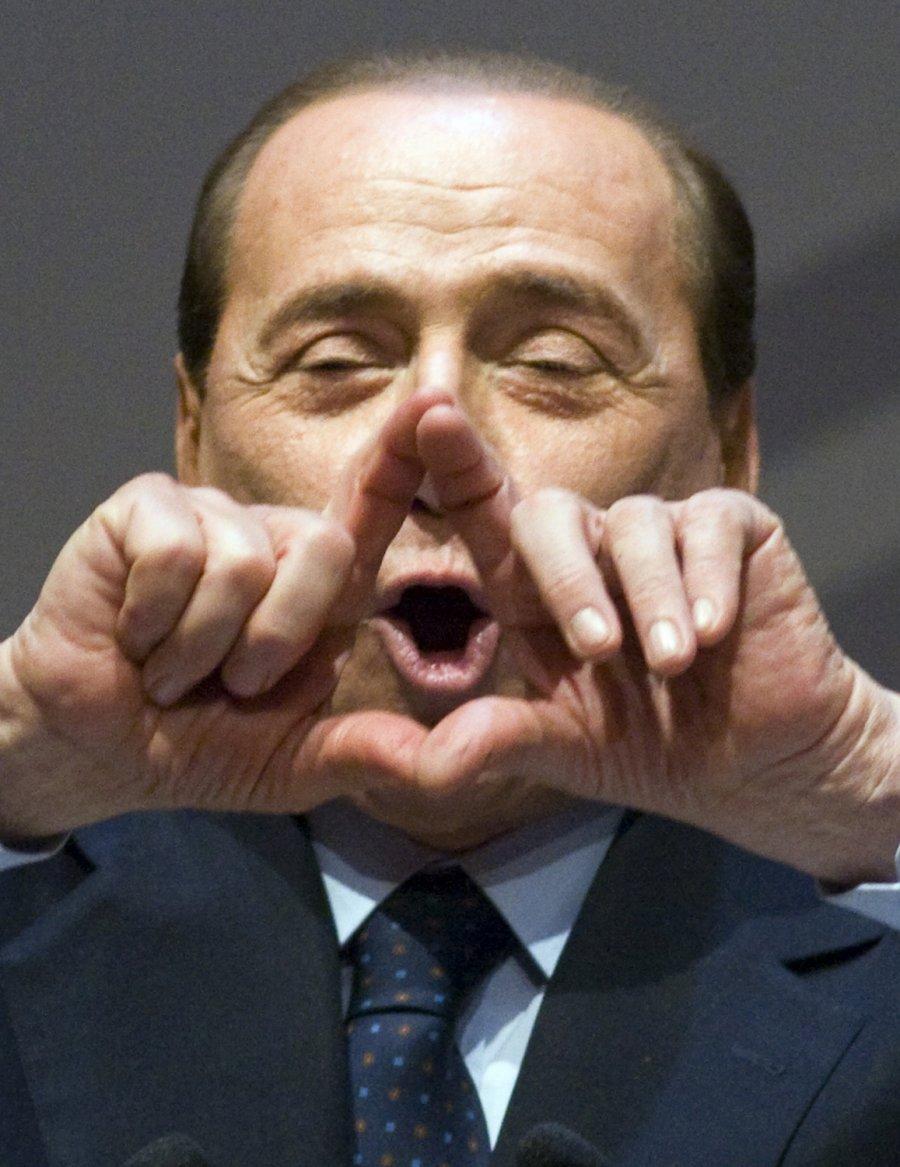
Berlusconi just being himself